UC Santa Barbara Aims to Replicate Gauchos’ 1979 NCAA Championship Run
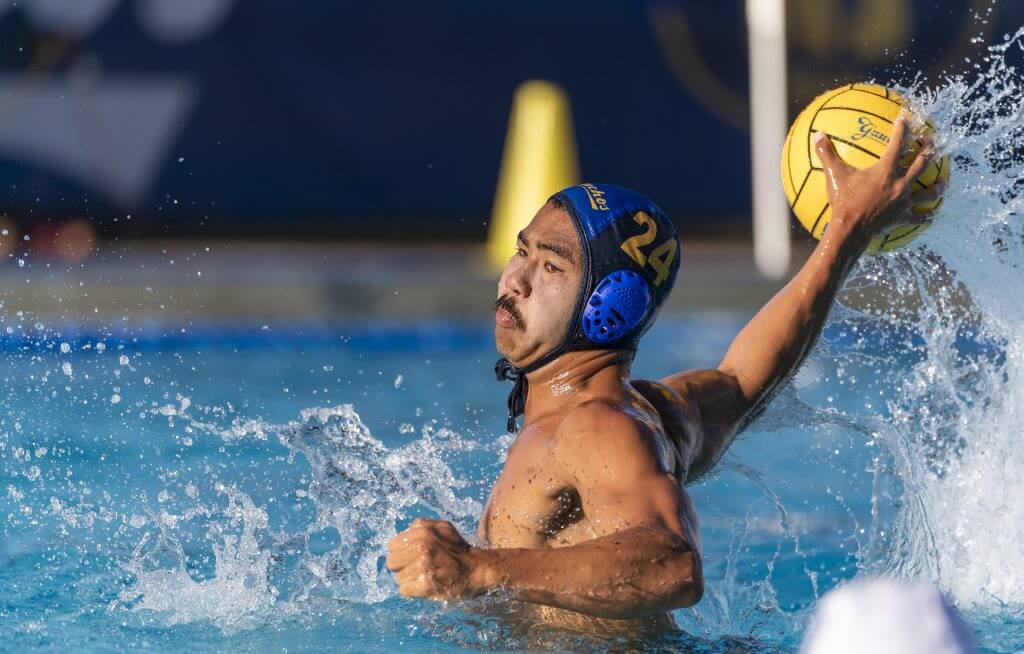
40 years ago, UC Santa Barbara won its only NCAA water polo championship on the backs of its outstanding goalie Craig Wilson and All-American high scorers Greg Boyer and John Dobrott.
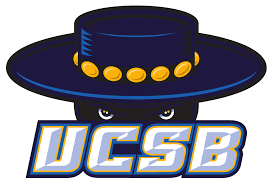 The 1979 season was a perfect storm for UCSB that resulted in a national championship. After a tie with Stanford in the season’s first meeting, then losing to the defending champion in the second, the Gauchos squeaked out a 10-9 semifinal victory over the Cardinal at the old Belmont Plaza Pool in Long Beach, California.
The 1979 season was a perfect storm for UCSB that resulted in a national championship. After a tie with Stanford in the season’s first meeting, then losing to the defending champion in the second, the Gauchos squeaked out a 10-9 semifinal victory over the Cardinal at the old Belmont Plaza Pool in Long Beach, California.
After that back-and-forth tussle, UCSB cruised to its first NCAA championship the next day, capturing a relatively easy 11-3 victory over UCLA.
According to Mike Yates, whose teammate was his brother Bill, that USBC team had an outstanding work ethic.
“We always worked harder than anyone else, individually and as a team,” he reminisced in 2012.
“Everyone was devoted and wanted to win,” Joel Wade said in the same piece about the ’79 team, which went 28-2-1. Dobrott, who tallied 214 goals from 1976-79, agreed: “We had a great team chemistry,” he said.
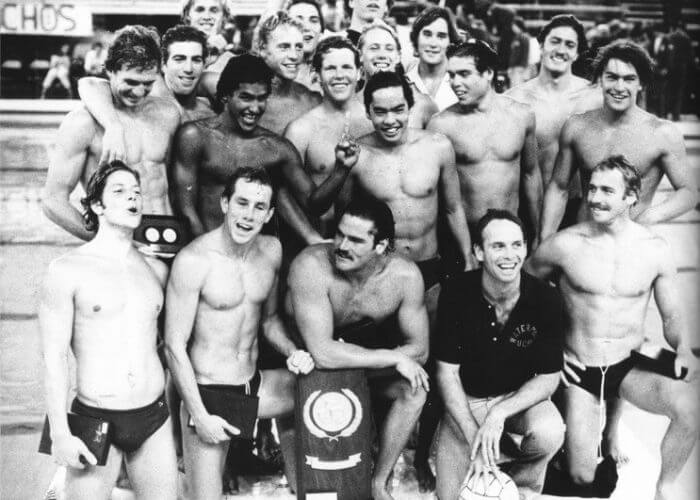
The 1979 team with their NCAA hardware. Photo Courtesy: UCSB Athletics
Four decades after their unparalleled success, UC Santa Barbara appears on the verge of another magical season. This week’s CWPA Top 20 ranking has the Gauchos as the nation’s top team for the first time in 40 years.
Hard work and team chemistry are similarly part of the 2019 team’s early success—whether the players are in the water or waiting on the bench—and is why the Gauchos catapulted up from an initial #7 preseason ranking. At the Triton Invitational on the season’s opening weekend, they handily defeated #7 Pepperdine 11-5 on September 7th, then #4 UC Berkeley 8-5 and #5 Long Beach State 12-9 September 8th. Another win over #6 Pepperdine on September 19th, and—most remarkably—wins over #1 USC (13-9) on September 15th, and then Stanford, the new #1, on September 20th by a score of 15-10.
[#2 UC Santa Barbara Storms into Avery, Shocks #1 Stanford in Men’s Water Polo]
With a perfect 13-0 record, UC Santa Barbara has eclipsed the school’s longest win streak at 12, a standard set by the 1979 team.
Over the next two weeks, UC Santa Barbara will face an onslaught of rivals at the MPSF Invitational at UCLA and then, in order, USC, UCLA, #4 UOP, Long Beach State, and UC Berkeley. Based on its play to date this season, the Gauchos have a legitimate chance to extend its run of success against the best in America.
Unheralded player becomes key to Gaucho success
As improbable is their undefeated record has been is the emergence of little-known junior Leo Yuno of Marina High School in Huntington Beach, California. The 5-10 attacker scored 4 goals with 3 assists in the upset of the Cardinal at Stanford’s home pool and a goal with 2 assists in the upset of USC.
Last year in his first collegiate season, Yuno was UCSB’s third highest scorer—despite not being recruited out of high school.
“I wasn’t really recruited by many colleges,” he said. “I reached out to many different D1 teams, but I either never heard back or I got the classic response: ‘Fill out our questionnaire.’
“Fortunately, with the help of my club coaches [at SOCAL] and coaches from opposing teams in the Sunset League [with Newport Beach and Huntington Beach], I was able to talk to UCSB and Long Beach State.”
Eventually, the match between Yuno and UCSB coaches Wolf Wigo and Ryan McMillen fell right into place.
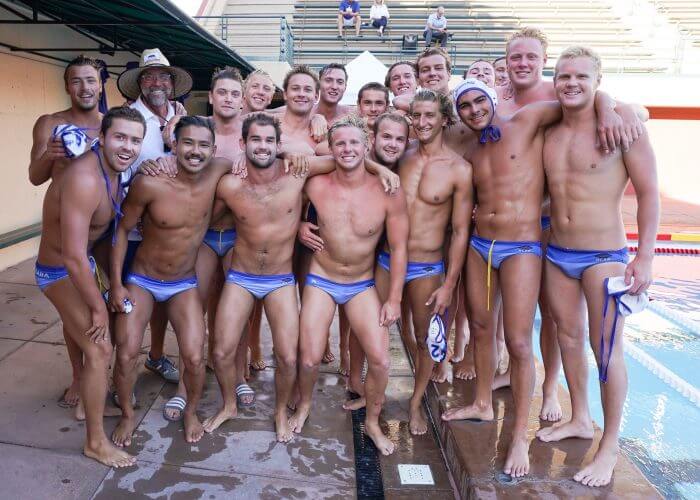
The Gauchos after beating #1 Stanford. Photo Courtesy: Catharyn Hayne
“I chose UCSB because they were consistently ranked top 10 in water polo and I wanted to play for a team that I could make an immediate impact on, rather than being a role player,” the sociology major explained. “Also, their style of play, the coaching, and the players made it feel like a perfect match for me.”
UCSB recruited heralded foreigners as well as players from traditional high school water polo hotbeds like Newport Beach, Long Beach Wilson, Campolindo, Santa Barbara, Agoura, and St. Francis. Conversely, Yuno’s high school was so over-matched it did not win a league game for 8 years—until Yuno had a monster game with six goals.
“My high school team never made the CIF playoffs,” he explained. “We only won one league game in my four years at Marina, in game against Edison during my junior year. We also rarely had a winning record.
“I had a hard time getting used to losing, but eventually I figured out, it wasn’t all about winning,” he added.
Without exposure outside the Sunset League in Orange County, Yuno was a diamond yet to be discovered. “I made All-League Second Team during my freshman and junior years and All-League First Team during my sophomore and senior years. But I never got anything outside of All-League because my high school team never made it further than regular season games.”
He continued to play year-round with some very good, established club teams. But exposure to college coaches remained limited—and interest from colleges was non-existent.
“I played for United Water Polo Club up until 14U, then I moved over to SOCAL Water Polo,” Yuno said. “The teams I played for never won Junior Olympics, but we were always in the Platinum Division, playing against the best teams. I was on the B team in 14U when we won gold in the Gold Division.
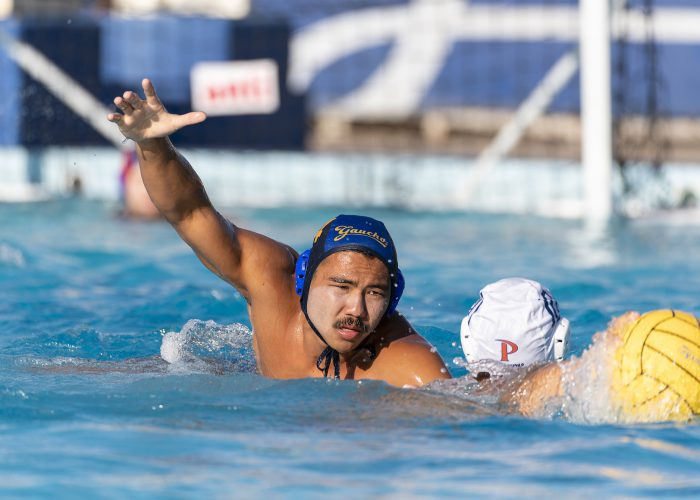
Yuno is a grinder. Photo Courtesy: Jeff Liang
“The teams that I played on always came close to the championship, although we would always hit a bump in the road and end up in the fifth or seventh place game. There was one year that I was a USA Water Polo All-American when I was on the SOCAL 16U team. We got fifth place that year.”
While his talents are clearly evident now in college, he had to work on his skills. “I wish that I was naturally talented from the start, but all my attributes are thanks to my coaches and my parents,” Yuno explained. “My 10U coach, Ryan Poole, help me have a strong base in my polo game. He always reminded me to use my legs and wrist to shoot.
“But my mom is the real reason that I’m at the level where I am today. She would push me to the limit by critiquing my effort at practice and games. I would always get yelled at after games if I looked like I was barely trying. Without her help, I wouldn’t have improved my game.”
Success is not guaranteed
As Yuno has gone from a relatively unknown high schooler to a hard-nosed collegian with a quick shot and blazing speed, he remains grounded. Despite his goal production and offensive success, he remains tireless in his preparation—and appreciative of the opportunities at UCSB.
“I would say that I’m a hard worker—because if I don’t work hard, someone will replace me,” he reasoned. “There are always players who are ready to fill the same role as mine.
“I try to hone my individual skills as much as possible at practice, but the only reason I am at the level I’m at today is because of my teammates,” Yuno said. “Without them going 100% at practice, I wouldn’t be where I am right now.
Yuno appreciates the possibility that UCSB may enjoy its best season in school history – an incredible transition from last season when UCSB put itself on probation despite being one of the top teams in the Golden Coast Conference (GCC).
[UCSB Statement on Skipping 2018 GCC Men’s Water Polo Tournament]
Like the 1979 NCAA championship team that enjoyed great team chemistry, Yuno describes his perspective of the change. “The biggest difference from last year and this year is our team chemistry. Everyone wants to achieve the ultimate goal, becoming NCAA champions. And everyone knows, for us to achieve this goal, we all need to play as a team and have no selfish desires to be the hero of the game.”
During this season, Yuno has contributed at key points during the upset victories, including the win over Stanford.
“The 4 goals and 3 assists against Stanford were because of my teammates who were constantly moving and tiring Stanford out. Without their help, I would not have had so many goals – or any goals.
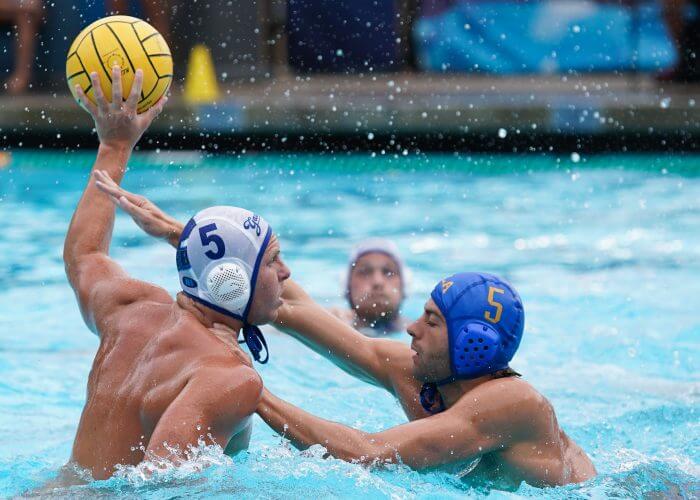
UCSB’s Cole Bronsan (white cap) has been key to the Gaucho’s rise. Photo Courtesy: Catharyn Hayne
Then admitting that he and his teammates had added incentive, Yuno added: “I had a chip on my shoulder from last year, when we played them at home and we lost by two. I had three goals scored on me and I told myself that the next time we play them, [the outcome] was going to be different.”
A future beyond UCSB?
Both his parents were born in Japan, and Yuno retains Japanese citizenship. He has two more years of college eligibility, but his future in the game may not end at the NCAA level, especially because the Japanese national team has emerged in the water polo world.
[Japan Water Polo – A new direction for the sport?]
“The idea of trying out for the Japanese team sounds awesome, but the level of play where I am at right now is not high enough to keep up with the current Japanese national team players,” he said with stereotypical Japanese humility. “Somewhere in the near future, I could see myself trying out for [Japan].”
But first there’s an NCAA season that offers tremendous opportunity for Yuno and his #1 ranked teammates. On a roster that includes a number of undersized players, the Gauchos now have big targets on their back as they aim to create championship memories of their own.



